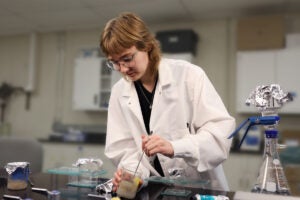Nicholas A. Peppas was elected today to the Institute of Medicine (IOM) of the National Academy of Sciences, becoming the first faculty member from The University of Texas at Austin to receive this honor–the highest recognition a scientist or engineer in the medical sciences can receive in the United States.

Peppas, professor of biomedical engineering, chemical engineering and pharmaceutics, is already a member of the National Academy of Engineering (NAE) and the National Academy of France (Pharmacy).
His election places him in select company among the nation’s engineers and scientists. Within the NAE membership of about 2,000, he is one of four chemical engineers and one of eight biomedical engineers to be active members in both the NAE and IOM. Peppas is the only pharmaceutical scientist in both.
“As a scholar, educator, and entrepreneur, Dr. Peppas brings great distinction to the Cockrell School as the first faculty member at UT Austin to be elected to the Institute of Medicine,” said Gregory L. Fenves, dean of the Cockrell School of Engineering. “This honor, along with his earlier election to the National Academy of Engineering, exemplify the excellence to which our school aspires.”
Peppas is one of 65 IOM members elected this year. He was cited for “seminal contributions and visionary leadership in pharmaceutical sciences, drug and protein delivery, and biomaterials science, and for pioneering fundamental work on drug delivery that has led to numerous pharmaceutical products or devices.”
In more than three decades of research, Peppas has been recognized as the “father of modern drug delivery” and a world authority in controlled drug delivery. Most recently, he received local and international media attention for his continued development of an insulin capsule to replace painful insulin injections for people with diabetes. The same technology has been used for the transmucosal delivery of calcitonin (for treatment of osteoporosis in post-menopausal women) and interferon-alpha (for cancer therapy). It is under study for interferon-beta release to treat patients with multiple sclerosis.
“I am deeply honored and humbled by the decision of IOM and the recognition they have bestowed upon my research group and me,” Peppas said. “For more than 30 years we have dedicated our work to finding improved treatments for diabetes, osteoporosis and multiple sclerosis, and better materials for artificial organs and drug delivery products. I share this recognition with my students and other collaborators and I will continue leading our dedicated effort for the improvement of the quality of life of our patients.”
Other devices he has developed, patented or commercialized include: intraocular lenses for cataract patients; improved materials for cartilage replacement; new materials for artificial heart linings; materials for vocal cord replacement/reconstruction; and biogels for epidermal release of growth factors to improve wound healing. In the past three years, and with the help of Emergent Technologies, Inc. of Austin, he has founded three biotech companies in Austin to commercialize some of his new biomaterials and drug delivery systems.
Peppas earned his doctorate in chemical engineering from the Massachusetts Institute of Technology in 1973. He joined the faculty at The University of Texas at Austin in 2003 and directs the Laboratory of Biomaterials, Drug Delivery, Bionanotechnology and Molecular Recognition. His work is supported by the National Science Foundation, the National Institutes of Health and through the university’s privately funded Fletcher Stuckey Pratt Chair in Engineering.
“It is a great pleasure to welcome these distinguished and influential individuals to the Institute of Medicine,” said IOM President Harvey V. Fineberg. “Members are elected through a highly selective process that recognizes people who have made major contributions to the advancement of the medical sciences, health care and public health.”
Active members elect new members from among candidates nominated for their professional achievement and commitment to service. An unusual diversity of talent is assured by the institute’s charter, which stipulates that at least one-quarter of the membership be selected from outside the health professions, from such fields as the natural, social, and behavioral sciences, as well as law, administration, engineering and the humanities.
Established in 1970 by the National Academy of Sciences, the institute has become recognized as a national resource for independent, scientifically informed analysis and recommendations on human health issues. With their election, members make a commitment to devote a significant amount of volunteer time as members of IOM committees, which engage in a broad range of studies on health-policy issues.
A high-resolution photo of Peppas is available.



